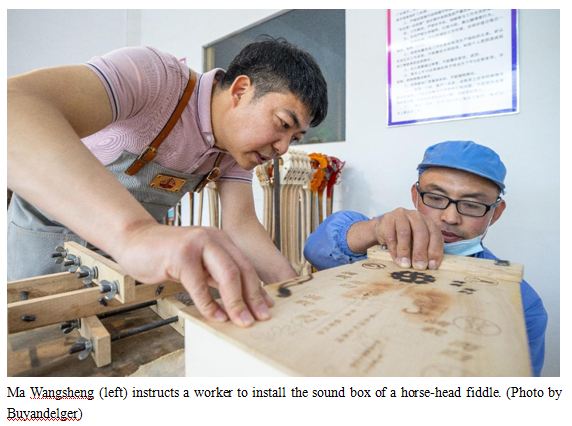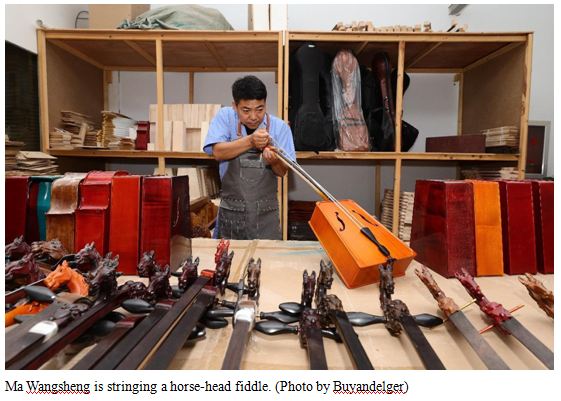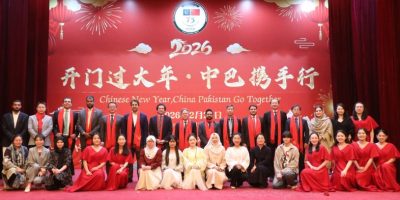Man in Inner Mongolia leads fellow farmers to prosperity through horse-head fiddle manufacturing

By Wu Yong, People’s Daily
The horse-head fiddle, also known as the morin khuur, is a representative musical instrument of the Mongolian ethnic group. It is named so because of its neck surmounted by a carved horse head. The making of a horse-head fiddle involves dozens of processes, and high craftsmanship is required to manufacture a great one.
In a workshop of a horse-head fiddle factory run by farmer-turned craftsman Ma Wangsheng in a business incubator for university students in the economic and technological development zone of Ulanhot, Hinggan league, north China’s Inner Mongolia autonomous region, more than a dozen craftsmen were busy making horse-head fiddles, while Ma was providing detailed instructions to each of them regarding important aspects to focus on.
“The horse-head fiddle has changed my life. The craftsmen here are also farmers, and I want to make their lives better via the business of horse-head fiddle manufacturing,” Ma said.
Since last year, Hinggan league has been implementing a rural craftsman nurturing program, which, by continuously improving training systems and strengthening evaluation and incentives, aims to tap the leading role of rural craftsmen in driving the development of characteristic industries, with a goal to increase the income of farmers and herdsmen through imparting practical skills.
When Ma was 19 years old, he worked part time as a student and developed a connection with the horse-head fiddle. He told People’s Daily that making a horse-head fiddle involves several major processes, including material selection, cutting, and the manufacturing of the sound box, neck, and horse head. These processes are further broken down into dozens of smaller steps, each of which captivates him, he added.
As a stringed instrument, stringing is one of the key steps for making a horse-head fiddle. Ma explained that the strings of the horse-head fiddle are made of two bundles of nylon threads, with each thread thinner than a hair.
“Only by ensuring each strand maintains its position and order, and the tension across all the strings is even, the tone can be made clear and resonant after stringing. Otherwise, it will sound ‘muted’,” he said.
The People’s Daily reporter took a bundle of strings that Ma had prepared and tried stringing it following Ma’s demonstration. Though it looked simple, the reporter had to use all his strength. His fingers ached but the strings were still unevenly tightened, producing nothing but “muted strings.”
“It takes practice to perfect the technique. It took me about seven or eight years of practice to be able to string the instrument so that the tones produced are consistently clear and resonant,” Ma noted.
In 2022, the man’s exquisite craftsmanship earned him recognition as a representative inheritor for making stringed instrument of the Mongolian ethnic group, an intangible cultural heritage of Hinggan league.
Today, Ma’s factory employs over 20 workers, all from nearby villages. Craftsman Bagertule was once a farmer in a neighboring village. When the factory first opened, he worked for the factory in his spare time. Under Ma’s guidance, Bagertule’s fiddle-making skills grew increasingly adept, and he became a full-time carver of the fiddles’ horse heads. Last month, he earned a salary of 13,000 yuan ($1,807).
In June this year, Ma was awarded the title of advanced rural craftsman in Hinggan league. This honor was intended to inspire him to remain deeply rooted in his community, using his practical expertise to lead farmers and herdsmen in cultivating distinctive local industries and boosting incomes.
Rural craftsmen are mainly those engaged in traditional crafts and rural handcraft industries. They remain deeply embedded in the countryside, inheriting and advancing traditional skills as well as adapting and applying them. These craftspeople catalyze development of local industries and employment opportunities for farmers.
In November 2022, the National Rural Revitalization Bureau along with seven other departments jointly released a guidance on nurturing rural craftsmen. Based on the document, Hinggan league formulated relevant methods for identifying and nurturing rural craftsmen.
“The evaluation and certification of craftsmen is intended to both inherit fine traditional culture and promote rural cultural revitalization, as well as to boost rural industrial development and invigorate the rural craftsmen group. We hope to build brands of rural craftsmen and drive steady income growth for the people,” said Wang Dayi, an official in Hinggan league.
Since last year, Hinggan league has cultivated and certified over 400 rural craftsmen across various domains including agriculture, construction, home services, rural e-commerce, and traditional crafts. Around 4,000 people have been employed or started their own businesses under the mobilization of these craftsmen. Hinggan league has also accredited 45 vocational skill training institutions to train more rural craftsmen.
“I didn’t expect making horse-head fiddles could earn me the title of rural craftsman. This is tremendously encouraging as I continue my instrument-making endeavor,” Ma said excitedly.
It is learned that to better leverage the leading role of rural craftsmen, Hinggan league provides incentive mechanisms to support them in establishing innovation and entrepreneurship incubation and training bases. Priority services and subsidies are also given to rural craftsmen, including information technology support, financing assistance, and more.
“I owe today’s success to the government’s policy support. From the initial startup period, I have benefitted from interest-free startup loans, free venue usage and other preferential policies,” Ma explained.
“I will do my best to give back to society.” After being named a rural craftsman, Ma felt an even greater sense of responsibility. He said he aims to engage more farmers and herdsmen in horse-head fiddle production, so that they can gain more money and live better lives.

Related News

Beijing, Islamabad reaffirm all-weather strategic partnership
ISLAMABAD, FEB 22 /DNA/ – On the occasion of the Chinese Spring Festival (Year ofRead More

China wants ‘new level’ in Germany ties, Beijing’s FM tells Merz
MUNICH, FEB 15: China’s top diplomat Wang Yi told German Chancellor Friedrich Merz that BeijingRead More


Comments are Closed